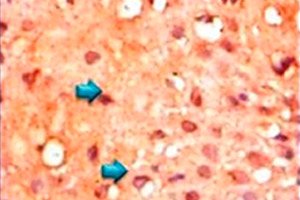
All iLive content is medically reviewed or fact checked to ensure as much factual accuracy as possible.
We have strict sourcing guidelines and only link to reputable media sites, academic research institutions and, whenever possible, medically peer reviewed studies. Note that the numbers in parentheses ([1], [2], etc.) are clickable links to these studies.
If you feel that any of our content is inaccurate, out-of-date, or otherwise questionable, please select it and press Ctrl + Enter.
HPV type 18 in pregnancy
Medical expert of the article
Last reviewed: 08.07.2025

It is difficult to say how dangerous the presence of the virus in the body is for each individual woman. Low-oncogenic viruses multiply more actively and affect a larger number of people, but our immune system is quite capable of fighting them, so in a couple of years there are no more viable virions left in the body.
The percentage of people infected with highly oncogenic types of the virus is significantly lower. But it is not so easy to defeat HPV 18 or HPV 16, so they can parasitize in the body for years, especially if the human immune system is noticeably weakened. It is not for nothing that statistics claim that these types of viruses are found in most patients with HIV infection. It is always easier for a virus to penetrate a weakened body and take root there, parasitizing inside cells and changing their properties. And a strong immune system, on the contrary, will restrain the reproduction of the virus.
It is also difficult to judge how dangerous the human papilloma virus is for a woman who dreams of becoming a mother of her own child. On the one hand, hormonal changes during pregnancy somewhat weaken a woman's immunity, and it becomes easier for pathogens to penetrate her body. But on the other hand, the fetus in the womb is not in danger. Infection is possible only during childbirth, when the child has to move through the birth canal, where the infection nests.
Pointed condylomas and anogenital warts caused by HPV strains 6 and 11 pose a greater risk of infection. Highly oncogenic types of papillomavirus are more likely to develop flat condylomas on the walls of the uterus and vagina. There are usually few such growths and they are less contagious, so infection of a child with dangerous HPV strains during childbirth is rare, and the baby's body usually copes with low-oncogenic strains on its own.
There is no link between HPV and problems with conceiving a baby. The presence of low-oncogenic strains in the body is not considered an obstacle to pregnancy. The only thing that a future mother may encounter is the appearance of external signs of infection (papillomas), if the disease was previously latent and the virions were inactive, or an increase in the size and number of neoplasms, if external signs were previously noticed. But an increase in the size of condylomas and warts is a certain discomfort for the woman herself, and it is recommended to remove them in any case.
It is another matter if the increase in condylomas occurs against the background of the introduction of HPV type 16 or 18. In this case, against the background of hormonal imbalance and decreased immunity, not only the growth of neoplasms is possible, but also their degeneration into a malignant tumor. True, this usually takes several years, and it is unlikely that such a terrible event will occur during the 9 months of pregnancy (unless the virus has been in the body of the expectant mother and has been active for more than one year).
If doctors detect a highly oncogenic virus when planning a pregnancy, they do not recommend rushing to conceive. HPV 16 or 18 do not affect the development and health of the child in the womb, do not increase the risk of early natural termination of pregnancy, do not interfere with conception, but weakening of the immune defense during pregnancy is dangerous for the woman herself. In this case, it is necessary to first undergo treatment, and if the doctor considers the treatment results sufficient, think about heirs.
When highly oncogenic HPV is detected during pregnancy, the woman must be under constant medical supervision and will be forced to take immunostimulating drugs that will slow the spread of the infection.
The fact that the risk of infecting the baby with papillomavirus infection during pregnancy is low, and the virus itself does not affect the possibility of conceiving a child, suggests that it is not necessary to refuse the opportunity to become a mother in this case. But it is imperative to be examined to detect HPV strains, at least to reduce the risk for yourself and your offspring. The health of the mother and baby depends on it.


 [
[